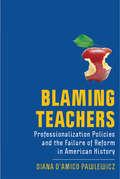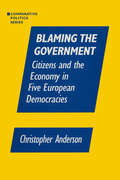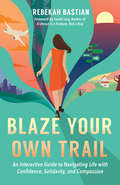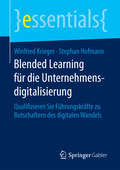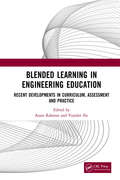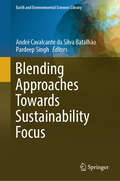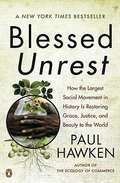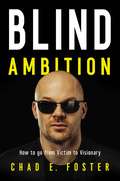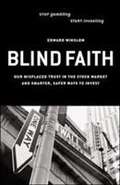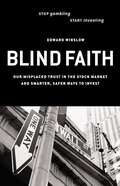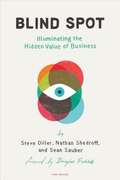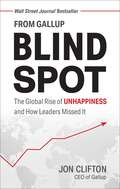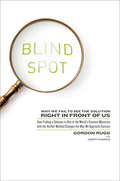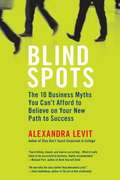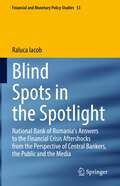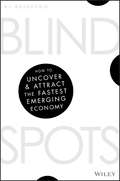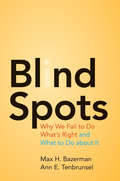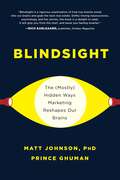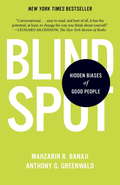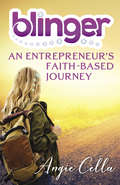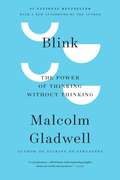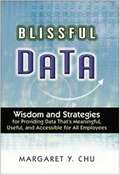- Table View
- List View
Blaming Teachers: Professionalization Policies and the Failure of Reform in American History (New Directions in the History of Education)
by Diana D'Amico PawlewiczHistorically, Americans of all stripes have concurred that teachers were essential to the success of the public schools and nation. However, they have also concurred that public school teachers were to blame for the failures of the schools and identified professionalization as a panacea. In Blaming Teachers, Diana D'Amico Pawlewicz reveals that historical professionalization reforms subverted public school teachers’ professional legitimacy. Superficially, professionalism connotes authority, expertise, and status. Professionalization for teachers never unfolded this way; rather, it was a policy process fueled by blame where others identified teachers’ shortcomings. Policymakers, school leaders, and others understood professionalization measures for teachers as efficient ways to bolster the growing bureaucratic order of the public schools through regulation and standardization. Beginning in the mid-nineteenth century with the rise of municipal public school systems and reaching into the 1980s, Blaming Teachers traces the history of professionalization policies and the discourses of blame that sustained them.
Blaming the Government: Citizens and the Economy in Five European Democracies
by Christopher A. AnzaloneThis work examines the impact of macroeconomic conditions on public support for the government in Britain, France, Netherlands, Denmark and Germany.
Blanchard Importing and Distribution Co., Inc.
by Paul W. Marshall Alan H. DrinanIllustration of the two main types of errors resulting from use of the economic order quantity (EOQ) as a tool in production scheduling. Designed to permit class discussion to begin with a consideration of one common type of mistake, errors in calculation of the EOQ volume resulting from use of incorrect data for the input parameters of the formula. The analysis can then shift to a more general discussion of the second type of error, the misapplication of EOQ and re-order point (ROP) techniques to a given system. Class discussion can conclude with student recommendations of alternative techniques which may be better suited to the Blanchard operation than the EOQ/ROP method.
Blaze Your Own Trail: An Interactive Guide to Navigating Life with Confidence, Solidarity, and Compassion
by Rebekah BastianA modern, feminist take on the classic choose-your-own-journey book, inspiring readers to embrace the fact that there is no singular right path—just your own! So many women enter their adult lives believing that they should know where they are going and how to get there. This can make life decisions feel intimidating and overwhelming. While some choices that lie ahead are fairly predictable, such as those surrounding career, partnership, and motherhood, the effects of these choices can lead to more complicated and unexpected turns that are seldom discussed.Rather than suggesting a rule book, Rebekah Bastian, vice president at Zillow and recognized thought leader, inspires you to Blaze Your Own Trail. "I have the benefit of being a living example of crooked paths, magnificent screw-ups, and shocking successes," she writes. Through storylines and supportive data that explore workplace sexism, career changes, marriage, child-rearing, existential crises, and everything in between, you will learn to embrace and feel less alone in your own nonlinear journey. Even better, you can turn back decisions and make different ones. Blaze Your Own Trail includes nineteen possible outcomes and many routes to get there. You will find that you have the strength to make it through any of them.
Blended Learning für die Unternehmensdigitalisierung: Qualifizieren Sie Führungskräfte zu Botschaftern des digitalen Wandels (essentials)
by Winfried Krieger Stephan HofmannDieses essential zeigt, wie Sie in der neuen digitalen Welt Lernen und Qualifizieren gestalten können, damit sich Kommunikation und Führung verändern und Führungskräfte zu digitalen Botschaftern in ihrem eigenen Unternehmen werden. Nichts ist so praktisch wie eine gute Theorie – deshalb erläutern die Autoren die Konzepte des 70-20-10-Referenzmodells sowie die motivationalen Ideen der Self-Determination-Theory und der systemisch-konstruktivistischen Didaktik. Auf dieser Grundlage wird ein erprobtes Kurs- und Lerndesign vorgestellt, das sich am Konzept des erweiterten Blended Learning orientiert und nachhaltige Umsetzungserfolge ermöglicht.
Blended Learning in Engineering Education: Recent Developments in Curriculum, Assessment and Practice
by Ataur Rahman Vojislav IlicBlended Learning combines the conventional face-to-face course delivery with an online component. The synergetic effect of the two modalities has proved to be of superior didactic value to each modality on its own. The highly improved interaction it offers to students, as well as direct accessibility to the lecturer, adds to the hitherto unparalleled learning outcomes. "Blended Learning in Engineering Education: Recent Developments in Curriculum, Assessment and Practice" highlights current trends in Engineering Education involving face-to-face and online curriculum delivery. This book will be especially useful to lecturers and postgraduate/undergraduate students as well as university administrators who would like to not only get an up-to-date overview of contemporary developments in this field, but also help enhance academic performance at all levels.
Blending Approaches Towards Sustainability Focus (Earth and Environmental Sciences Library)
by Pardeep Singh André Cavalcante da Silva BatalhãoIn an era defined by environmental challenges and the urgent need for sustainable practices, this book emerges as a groundbreaking resource for public and private organizations, practitioners, users of environmental services, and professionals in the fields of environmental sciences, engineering sciences, and business sciences. This thought-provoking book delves into the intricate realm of sustainability, offering profound insights, theoretical frameworks, and practical solutions that can be applied across diverse sectors and systems worldwide. Purpose and the Need for a New Resource: Authored with a visionary perspective, this book aims to catalyze change and inspire action in the face of pressing global challenges. The urgency of addressing energy transition, waste management, sustainable supply chain, and circular economy has never been more evident. As we navigate a world grappling with climate change, resource depletion, and ecological degradation, there is a critical need for a comprehensive and up-to-date resource that provides both theoretical foundations and technical guidance on sustainable practices. This book fills a crucial gap in the literature by addressing these pressing concerns and equipping readers with the knowledge and tools necessary to foster a sustainable future. By amalgamating insights from environmental, engineering, and business sciences, "Sustainable Futures" offers a multidisciplinary approach, presenting a holistic understanding of sustainability and its interconnectedness with various sectors and systems. Solving Problems for Readers: The book illuminates the theoretical underpinnings of sustainability while equipping readers with tangible mechanisms for transformative action. By bridging the gap between theory and practice, this book empowers practitioners and professionals alike to implement sustainable strategies and initiatives within their organizations. Moreover, this book recognizes the need for context-specific approaches, acknowledging the diverse range of systems and sectors around the world.
Blenheim Chalcot
by John R. Wells Benjamin Weinstock"In April 2019, Manoj Badale and Charles Mindenhall, co-founders of Blenheim Chalcot, were contemplating how they might go about developing their portfolio. Since founding the company as an internet consultancy called netdecisions in 1998, Badale and Mindenhall had transformed Blenheim Chalcot into the United Kingdom's "leading digital venture builder," having successfully built, and, in 15 instances, exited, 42 businesses across a number of sectors, including technology, financial services, sport, media, property, and education. In 2018, Blenheim Chalcot had portfolio sales of over 350 million and employed over 3,000 people. Unlike a traditional venture capital firm, Blenheim Chalcot was a "venture builder," often developing its own ideas then bringing in and supporting entrepreneurs with a range of services and support, and funding them in return for a majority equity stake (typically 80-90%). The idea was to increase the probability of success by allowing the entrepreneurs and their teams to spend less time fundraising and dealing with time consuming tasks, such as property, recruitment, legal set up, and gaining access to a client network. This enabled the entrepreneur to focus more on product and customers. The downside of this approach was that the growth of the group was somewhat constrained by the founders' own capital and their access to co-investment funds. As Badale and Mindenhall contemplated the future, they were asking themselves how they could best develop their ecosystem for building innovative businesses. In October 2018, they had opened an office in New York. They were also partnering with Imperial College London to open a 200,000 square-foot tech and innovation campus in early 2020. Should they continue on their current track? Or, should they be bolder, perhaps going public, adding new sectors, more businesses, bigger opportunities, and expanding into new geographic markets?
Blessed Unrest
by Paul HawkenOrganizations working to restore the environment and foster social justice collectively comprise the largest movement on earth. This movement with no name, leader, or location is a creative expression of people's needs worldwide.
Blind Ambition: How to Go from Victim to Visionary
by Chad E. FosterFor anyone seeking to live life to its fullest potential, Blind Ambition is an eye-opening account of a tech industry star executive who overcame fear and hopelessness to turn his disadvantage of blindness into a powerful competitive strength.While most people were preparing for the adventure of adult life, Chad E. Foster was watching the world he grew up with fade to black. But that didn&’t stop him from becoming the first blind person to graduate from the Harvard Business School leadership program and climbing the corporate ladder as a successful Finance/Sales executive. With determination, ambition, and drive, Chad created what Oracle said would be impossible. He gave millions of people the ability to earn a living by becoming the first to create customer relationship software for the visually impaired.In these pages, readers will: Be inspired by Chad&’s story of how he transformed the loss of his vision into a gift that provided him with unique strengths and abilities he did not have when he could see.See how we choose the stories we tell ourselves about our circumstances and how this either limits us or propels us towards our goals.Gain new perspective on what is possible when you shift your mindset, give up making excuses, and decide that you are in charge of who you want to be.Learn the mental model that Chad uses to quickly overcome frustrations and stressors.Chad is happier and more successful today than when he could see. Overcoming the challenges of blindness has improved his perspective, making him more resilient and grateful for the life that he has. Ultimately, Chad's unforgettable lessons and outlook will inspire readers to overcome their perceived limitations and explore new possibilities where they once may have only seen obstacles.
Blind Faith: Our Misplaced Trust in the Stock Market and Smarter, Safer Ways to Invest
by Edward WinslowThe founder of the first financial planning cooperative formed in the US and the first NASD registered brokerage firm to specialize in socially responsible investments debunks the idea that common stock is the best long-term investment. And presents safer alternative strategies for investors.
Blind Faith: Our Misplaced Trust in the Stock Market--And Smarter, Safer Ways to Invest
by Edward WinslowThe risk of investing in the stock market has increased remarkably over the last decade. In this period we've seen tremendous volatility in stock prices, a market bubble and its subsequent pop, a parade of corporate scandals, the demise of a leading accounting firm and proven deception by many so-called investment analysts employed by major brokerage firms. In addition, the realities of ever-increasing geopolitical risks contribute to an uncertain economic future. Blind Faith offers a cleverly simple yet revolutionary approach for managing investments in this perpetual high-risk environment. Corporate America and the investment industry have little to gain and lots to lose when investors decide to stop playing the traditional game that can -and has - destroyed trillions of dollars of individual wealth overnight. Readers will be equipped with both the strategy and the tools for success in virtually any economic environment while ending their participation in a system that has taken full advantage of their blind faith and misplaced trust.
Blind Spot
by Nathan Shedroff Sean Tauber Steve DillerDistracted by traditional metrics and mounting access to data, leaders are blinded to what it actually takes to create greater value for their businesses: meaningful, long-term relationships with their customers.In Blind Spot, you'll learn how exceptional organizations--from Disney to Instagram--innovate and sustain valuable, productive customer relationships. Blind Spot's lessons deliver a groundbreaking perspective shift and win-win approach for your customers, your business--and even your shareholders.
Blind Spot: The Global Rise of Unhappiness and How Leaders Missed It
by Jon CliftonThe rising unhappiness that leaders didn&’t see Unhappiness has been increasing globally for a decade, according to Gallup — and its rise has been missed by almost every world leader.That&’s because while leaders pay close attention to measures like GDP or unemployment, almost none of them track their citizens&’ wellbeing. The implications of this blind spot are significant and far-reaching — leaders missed the citizen unhappiness that triggered events ranging from the Arab uprisings to Brexit to the election of Donald Trump. What are they going to miss next? Grounded in Gallup&’s global research, Blind Spot makes the urgent case that leaders should measure and quantify wellbeing and happiness — how citizens&’ lives are going — and shows them how. It also discusses the five key elements of a great life and where the world needs to improve in each of them to better the lives of people everywhere.
Blind Spot: Why We Fail to See the Solution Right in Front of Us
by Gordon RuggThe Voynich Manuscript has been considered to be the world's most mysterious book. Filled with strange illustrations and an unknown language, it challenged the world's top code-crackers for nearly a century. But in just four-and-a-half months, Dr. Gordon Rugg, a renowned researcher, found evidence (which had been there all along) that the book could be a giant, glittering hoax. In Blind Spot: Why We Fail to See the Solution Right in Front of Us, Dr. Rugg shares his story and shows how his toolkit of problem-solving techniques—such as his Verifier Method—can save the day, particularly in those times when the experts on your team have all the data in front of them but are still unaccountably at an impasse. In the tradition of Malcolm Gladwell and Dan Ariely, Dr. Rugg, a rising star in computer science, challenges us to re-examine the way we think, and provides new tools to solve problems and crack codes in our own lives.
Blind Spots
by Alexandra Levit"You want-you need-Alexandra Levit as your guide." -Daniel H. Pink, New York Times bestselling author of Drive There's been a major paradigm shift in business practices and the workplace. Alexandra Levit tells readers what no longer holds true for getting ahead today, and debunks business myths that are more dangerous and less viable than ever-given the current climate of ethical scrutiny and intense competition-including it's best to climb the ladder as fast as possible, and that employers want you to be yourself.Levit offers something better in place of these myths: practical advice on what it really takes to succeed in this new values-driven environment.
Blind Spots in the Spotlight: National Bank of Romania's Answers to the Financial Crisis Aftershocks from the Perspective of Central Bankers, the Public and the Media (Financial and Monetary Policy Studies #53)
by Raluca IacobThis book brings under a magnifying glass a little explored, but significant topic - the communications changes of the National Bank of Romania after 2008. Given the similarities and differences between central banks’ mechanisms and practices adopted, its applicability and impact for other actors are incontestable. The research incorporates valuable details on how the National Bank of Romania’s communication changed during the Great Recession of 2008, as well as insightful data about the way in which different categories of public and media perceived this change. The timeliness and significance of this research are noticeable as the central banks already entered a new era of communication challenges triggered by the Covid-19 pandemic and recently by the Russia – Ukraine war. Lessons from the past can contribute to what researchers name the second revolution in communication, focusing on opening the central banks to the public and regaining trust, especially in such a difficult period.
Blind Spots: How to uncover and attract the fastest emerging economy
by Rj BridesonAre you ready for the next global economic disruption? Blind Spots outlines the way forward for companies who want to get early-mover advantage on this new $28 trillion economy. This powerful market has remained untapped, ignored and underserved despite the fact it is more economically powerful than India and China together – twice over and continues to rise. Women: they drive the majority of our purchases, they're outpacing men in graduate education and they routinely make or break brands by voting with their swelling wallets. This book shows you exactly how to tap into the modern female market and reap its numerous financial benefits before your competitors do. Written by Australia's definitive marketing-to-women authority and gender intelligence expert Bec Brideson, this book provides a practical framework for future-focused businesses who are done debating gender, and ready for profit and action. Women's impact on the bottom line is becoming undeniable but the grey areas around gender hold us back. Change is moving glacially thanks to tokenistic brand efforts and homogenous, risk-averse corporate reasoning. If you're ready to take the sort of bold, decisive action that cements market leaders and visionaries; this book is for you. Brideson will show you how to: Single out a competitive advantage in a volatile, slow-growth market. Bridge the gap between gender nuance and commercial gain. Leverage authentic insights into a long-term, loyal relationship. In the search for advantage, CEOS look to technology for disruption yet they consistently neglect the market providing innovation and better profitability to the status quo. Blind Spots provides the framework and critical shift in perspective for making it in the new economy of women.
Blind Spots: Why We Fail to Do What's Right and What to Do about It
by Max H. Bazerman Ann E. TenbrunselWhen confronted with an ethical dilemma, most of us like to think we would stand up for our principles. But we are not as ethical as we think we are. In Blind Spots, leading business ethicists Max Bazerman and Ann Tenbrunsel examine the ways we overestimate our ability to do what is right and how we act unethically without meaning to. From the collapse of Enron and corruption in the tobacco industry, to sales of the defective Ford Pinto, the downfall of Bernard Madoff, and the Challenger space shuttle disaster, the authors investigate the nature of ethical failures in the business world and beyond, and illustrate how we can become more ethical, bridging the gap between who we are and who we want to be. Explaining why traditional approaches to ethics don't work, the book considers how blind spots like ethical fading--the removal of ethics from the decision--making process--have led to tragedies and scandals such as the Challenger space shuttle disaster, steroid use in Major League Baseball, the crash in the financial markets, and the energy crisis. The authors demonstrate how ethical standards shift, how we neglect to notice and act on the unethical behavior of others, and how compliance initiatives can actually promote unethical behavior. They argue that scandals will continue to emerge unless such approaches take into account the psychology of individuals faced with ethical dilemmas. Distinguishing our "should self" (the person who knows what is correct) from our "want self" (the person who ends up making decisions), the authors point out ethical sinkholes that create questionable actions. Suggesting innovative individual and group tactics for improving human judgment, Blind Spots shows us how to secure a place for ethics in our workplaces, institutions, and daily lives.
Blindsight: The (Mostly) Hidden Ways Marketing Reshapes Our Brains
by Matt Johnson Prince GhumanEver notice that all watch ads show 10:10 as the time? Or that all fast-food restaurants use red or yellow in their logos? Or that certain stores are always having a sale? You may not be aware of these details, yet they've been influencing you all along. Every time you purchase, swipe, or click, marketers are able to more accurately predict your behavior. These days, brands know more about you than you know about yourself. Blindsight is here to change that. With eye-opening science, engaging stories, and fascinating real-world examples, neuroscientist Matt Johnson and marketer Prince Ghuman dive deep into the surprising relationship between brains and brands. In Blindsight, they showcase how marketing taps every aspect of our mental lives, covering the neuroscience of pain and pleasure, emotion and logic, fear and safety, attention and addiction, and much more. We like to think of ourselves as independent actors in control of our decisions, but the truth is far more complicated. Blindsight will give you the ability to see the unseeable when it comes to marketing, so that you can consume on your own terms. On the surface, you will learn how the brain works and how brands design for it. But peel back a layer, and you'll find a sharper image of your psychology, reflected in your consumer behavior. This book will change the way you view not just branding, but yourself, too.
Blindspot: Hidden Biases of Good People
by Anthony G. Greenwald Mahzarin R. BanajiI know my own mind.I am able to assess others in a fair and accurate way.These self-perceptions are challenged by leading psychologists Mahzarin R. Banaji and Anthony G. Greenwald as they explore the hidden biases we all carry from a lifetime of exposure to cultural attitudes about age, gender, race, ethnicity, religion, social class, sexuality, disability status, and nationality."Blindspot" is the authors' metaphor for the portion of the mind that houses hidden biases. Writing with simplicity and verve, Banaji and Greenwald question the extent to which our perceptions of social groups--without our awareness or conscious control--shape our likes and dislikes and our judgments about people's character, abilities, and potential.In Blindspot, the authors reveal hidden biases based on their experience with the Implicit Association Test, a method that has revolutionized the way scientists learn about the human mind and that gives us a glimpse into what lies within the metaphoric blindspot.The title's "good people" are those of us who strive to align our behavior with our intentions. The aim of Blindspot is to explain the science in plain enough language to help well-intentioned people achieve that alignment. By gaining awareness, we can adapt beliefs and behavior and "outsmart the machine" in our heads so we can be fairer to those around us. Venturing into this book is an invitation to understand our own minds.Brilliant, authoritative, and utterly accessible, Blindspot is a book that will challenge and change readers for years to come.
Blindspot: Hidden Biases of Good People
by Anthony G. Greenwald Mahzarin R. BanajiI know my own mind. I am able to assess others in a fair and accurate way. <p><p> These self-perceptions are challenged by leading psychologists Mahzarin R. Banaji and Anthony G. Greenwald as they explore the hidden biases we all carry from a lifetime of exposure to cultural attitudes about age, gender, race, ethnicity, religion, social class, sexuality, disability status, and nationality. “Blindspot” is the authors’ metaphor for the portion of the mind that houses hidden biases. Writing with simplicity and verve, Banaji and Greenwald question the extent to which our perceptions of social groups—without our awareness or conscious control—shape our likes and dislikes and our judgments about people’s character, abilities, and potential. In Blindspot, the authors reveal hidden biases based on their experience with the Implicit Association Test, a method that has revolutionized the way scientists learn about the human mind and that gives us a glimpse into what lies within the metaphoric blindspot. <p> The title’s “good people” are those of us who strive to align our behavior with our intentions. The aim of Blindspot is to explain the science in plain enough language to help well-intentioned people achieve that alignment. By gaining awareness, we can adapt beliefs and behavior and “outsmart the machine” in our heads so we can be fairer to those around us. Venturing into this book is an invitation to understand our own minds. <p> Brilliant, authoritative, and utterly accessible, Blindspot is a book that will challenge and change readers for years to come.
Blinger: An Entrepreneur's Faith-Based Journey
by Angie CellaThe inspirational story of how a single mom, with the help of her Christian faith and hard work, brought her dream product to market and became a success. A single mother of four, Angie Cella, dreamed one night about a device that put gems in her hair. She woke up thinking she would invent it because she loved what she had seen. A few weeks later, she had a second dream. In this one, God told her, &“I want you to make this product.&” As a woman with a burgeoning faith who&’d been waiting for just this kind of direction, Angie spent the next several years navigating the tough and often painful—yet ultimately gratifying—road to success. Blinger is the story of how Angie brought that dream to life, building a successful business out of nothing but inspiration and hard work. Along with helpful business tips, Angie candidly shares all the fun and excitement, plus the letdowns, the failures, and the pain of bringing an invention to life—and how the power of faith can propel us when we feel like we just can&’t go on anymore. Blinger is a testament to the belief that any dream is possible if you work hard and stay true to your faith.
Blink: The Power of Thinking Without Thinking
by Malcolm GladwellIn his landmark bestseller The Tipping Point, Malcolm Gladwell redefined how we understand the world around us. Now, in Blink, he revolutionizes the way we understand the world within. Blink is a book about how we think without thinking, about choices that seem to be made in an instant-in the blink of an eye-that actually aren't as simple as they seem. Why are some people brilliant decision makers, while others are consistently inept? Why do some people follow their instincts and win, while others end up stumbling into error? How do our brains really work-in the office, in the classroom, in the kitchen, and in the bedroom? And why are the best decisions often those that are impossible to explain to others?In Blink we meet the psychologist who has learned to predict whether a marriage will last, based on a few minutes of observing a couple; the tennis coach who knows when a player will double-fault before the racket even makes contact with the ball; the antiquities experts who recognize a fake at a glance. Here, too, are great failures of "blink": the election of Warren Harding; "New Coke"; and the shooting of Amadou Diallo by police. Blink reveals that great decision makers aren't those who process the most information or spend the most time deliberating, but those who have perfected the art of "thin-slicing"-filtering the very few factors that matter from an overwhelming number of variables.
Blissful Data: Wisdom And Strategies For Providing Meaningful, Useful, And Accessible Data For All Employees
by Margaret Y. ChuAnalyzing information and acting accordingly is a key strategic goal of every business. But vast quantities of data are of little use if they are not structured and kept in such a way as to be readily accessible and applicable. Only optimally organized information can drive maximum productivity. Blissful Data is a reader-friendly book that reveals what it takes to achieve a state of perfect organization within the environment of a successful data warehouse. This timely book will help the reader: * understand how data evolves into information that drives better decision making * recognize the pitfalls, caused by people and politics, that lead to short-sighted solutions and long-term problems * manage data warehousing costs, performance, and expectations effectively * apply project management fundamentals to data warehouse endeavors. Blissful Data includes dozens of examples, as well as case studies illustrating successful, unsuccessful, and disastrous data warehouse strategies.
